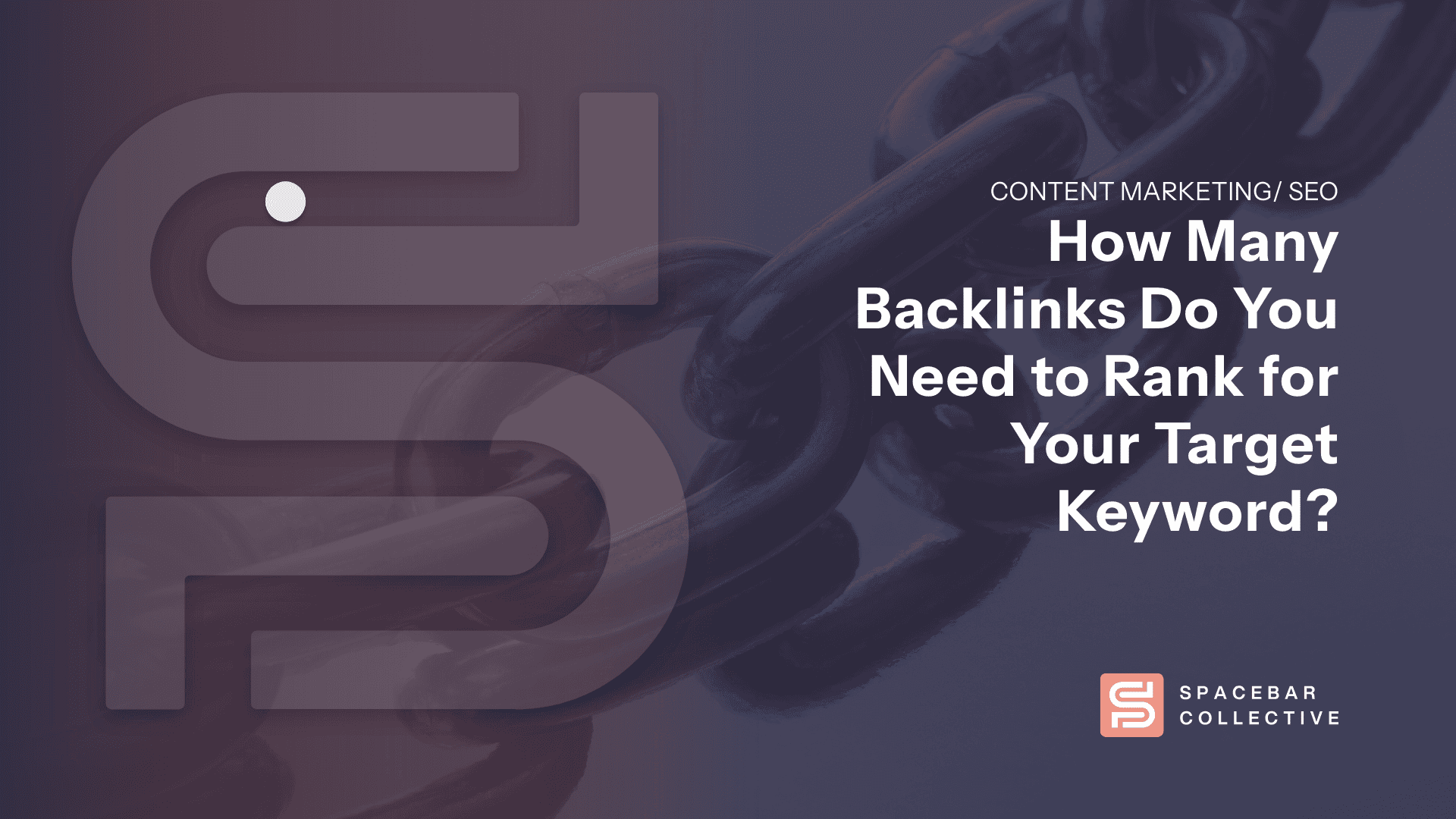Online search is changing in ways that would’ve seemed far-fetched just five years ago. For the longest time, SEO (informally called “ranking on Google”) was the undisputed channel for online visibility, and for good reason: it worked ridiculously well.
Today, large language models (LLMs) like ChatGPT, Gemini, and Perplexity are starting to rewrite the rules. These AI tools behave less like search engines and more like personal assistants that understand context, intent, and nuance.
Of course, the shift isn’t happening overnight. All major LLMs today collectively account for less than 1% of search traffic to most websites. But momentum is building. Users are gradually turning to LLMs for direct, synthesized answers rather than the familiar list of blue links.
Classic SEO still matters, and many of its principles still apply. But the spotlight is undeniably moving. And that’s why SEO specialists are now turning their attention to LLM SEO: optimizing for visibility within generative AI search responses.
This article explores how LLM SEO works, why it matters, and how to start preparing your brand for the road ahead.
What Does LLM SEO Mean?
LLM SEO is the process of optimizing your brand’s online presence, so it appears in AI-generated answers, not just in search results. It’s about earning mentions in the responses users get from LLMs like ChatGPT, Gemini, Claude, Perplexity, and more.
Unlike traditional search engines, LLMs don’t return a list of links. They return answers. Think summaries, statistics, product mentions, citations, etc. To do this, LLMs draw from a combination of indexed content, knowledge graphs, and reliable source material. For example, here are Gemini’s recommendations for the best website development tools:
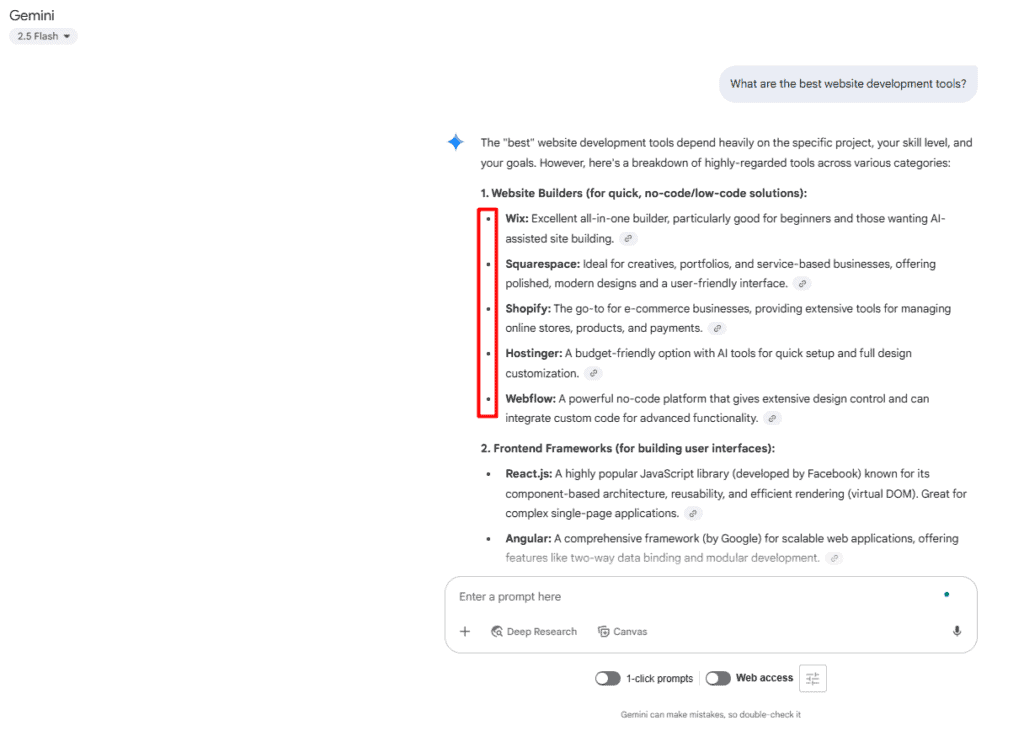
The tricky part is, LLMs are non-deterministic. You can’t “rank” in a fixed position. You can’t just stuff in keywords or chase SERP features. Your brand and content must be reference-worthy.
In that sense, LLM SEO is less about “ranking” and more about being understood and retrieved. These models use intent, relevance, and context to construct answers, which means brands must build widespread influence through:
- Clear positioning
- Consistent messaging
- Recognizable product names
- Credible citations from trusted third parties
- Public, structured information across sources like Wikipedia, Crunchbase, GitHub, etc.
It’s worth noting that not all LLMs work the same way, and that matters when you’re trying to understand how your brand might show up. Let’s break this down a bit.
The Two Types of LLMs (And Why They Matter for SEO)
Broadly speaking, there are two types of LLMs available today:
- Self-contained models
- Retrieval-Augmented Generation (RAG) models
Self-contained LLMs are trained on static data up to a certain cutoff date. If your content wasn’t included during their training period, it won’t appear, at least not directly. Your best bet is having brand mentions and resources spread across authoritative, frequently crawled sources like Wikipedia and news outlets.
By contrast, RAG models pull live data from the web during a query. They can cite up-to-date sources, link to your pages, and refer traffic to your site. Even better, you can test them in real time to see how your brand is being surfaced or if it’s showing up at all.
Case in point, here’s Perplexity’s results when asked about the best B2B SaaS SEO agencies in Canada:
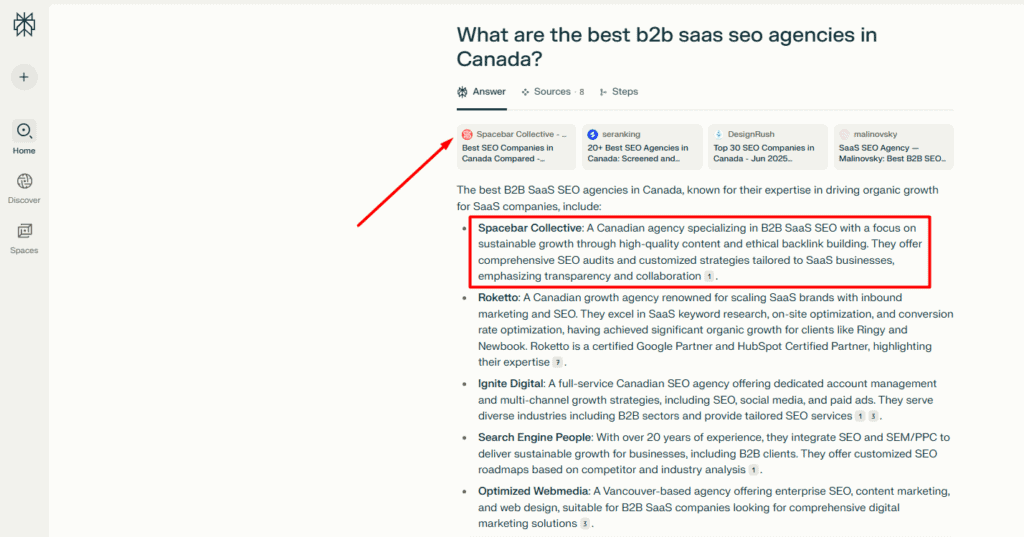
In RAG-based LLMs, SEO fundamentals like crawlability, structured data, and topical authority still matter. But with self-contained models, you’re optimizing your broader brand footprint, not just your website.
Why Should You Pay Attention to LLM SEO?
Right now, LLMs may not send massive amounts of referral traffic. Most sites see less than 1%. But all signs suggest that won’t last.
A 2024 Semrush study found that ChatGPT sent traffic to less than 10,000 unique domains daily in early July. By November, that number increased to over 30,000 unique domains. That’s a crystal clear signal that AI platforms are gradually becoming legitimate traffic sources.
To back up that point, Gartner predicts that 50% of search traffic will be lost to AI tools by 2028. The LLM market itself is projected to grow 36% by 2030, as AI chatbots increasingly become the first touchpoint in the buyer journey. People today are already using LLMs to:
- Compare software
- Decide between vendors
- Ask technical “how-to” questions
- Explore use cases for new tools
Another kicker? Studies show that search clicks are lower across the board, yet Google search impressions are climbing. In other words, the traffic LLMs deliver may be small today, but the long-term vote of confidence they offer is well worth chasing.
The window for first-mover advantage is still open. Early investment in LLM SEO services means building authority and mention-worthiness before the space becomes saturated with competitors fighting for the same AI real estate.
How to Optimize for LLM SEO Right Now
The good news about LLM SEO is that much of what works mirrors solid SEO fundamentals, just with a different end goal. And while no checklist guarantees inclusion in an AI answer, there are clear ways to improve your chances.
Here are seven strategies to give your brand the best shot at LLM SEO success:
Build a Public, Trustworthy Brand Footprint
LLMs, much like human experts, determine credibility by cross-referencing multiple sources. They build their understanding of your brand by consuming vast amounts of information across the internet and checking for consistent, verifiable signals.
Brands that show up consistently near trusted, topic-relevant sources are more likely to be cited in AI responses. To shape that proximity, you need to be publicly visible in reputable places.
Focus on:
- Wikipedia (considered the largest source of LLM training data)
- GitHub (for open-source tools, libraries, or dev-facing brands)
- Reddit (a key LLM training source, especially for OpenAI)
- Crunchbase and public/industry-specific directories like G2, Capterra, SaasHub, etc.
- Google Knowledge Graph and structured data sources
- Credible news outlets, trade publications, and PR databases
- Professional platforms like LinkedIn (consistent individual and company profiles)
Create Structured, Entity-Rich, Digestible Content
LLMs learn from patterns. They extract meaning not just from words, but from how information is structured and how often entities appear together. Your content should help the model confidently understand what your brand or product is and how it relates to specific problems.
Prioritize these elements to do just that:
- Clear, concise definitions (e.g., “What is intent-based lead scoring?”)
- Tables, bullet points, FAQs, and structured headings
- Consistent naming across pages (avoid rewording your brand or product name)
- Proprietary data, quotes, stats, and citations that reinforce trust (studies found that these tend to see 30% to 40% higher visibility in LLM responses).
And yes, schema markup still matters. While LLMs can’t directly “read” client-side schema (they only parse HTML), tools like Google’s Natural Language API may use it to better infer entities. In essence, schemas help search engines, not current LLM crawlers.
Here’s a more detailed look at LLM-friendly content formats that typically perform well:
| Format Type | Why It Helps LLM SEO | Example |
|---|---|---|
| Comparison articles | Structured comparisons are easily parsed and synthesized by AI systems | “Salesforce vs HubSpot for enterprise teams” |
| FAQs | FAQ schema markup gives LLMs explicit context for question-answer pairs | “Is AI-generated content penalized by Google?” |
| How-to guides | Step-by-step processes map well to multi-turn LLM prompts. | “How to build a content workflow in Notion” |
| Use-case-driven pages | Answers intent-rich prompts like “best tool for X.” | “Top platforms for B2B sales outreach” |
| Stat roundups/research | Original data tend to be reused and cited more often | “CRM adoption statistics for 2024” |
| Case studies | Real-world examples help LLMs understand practical applications | “How Slack increased user engagement by 40%” |
| Expert quotes or citations | Improves retrieval and trust, especially in RAG models like Perplexity | “According to Gartner, 62% of CMOs…” |
Get Mentioned by Other Trusted Sources
LLMs synthesize meaning from credible third-party mentions. In some cases, these outside citations carry more weight than self-published claims.
When TechCrunch mentions your funding round or when you’re quoted in an industry analysis, those references help AI systems understand your company’s place in the market. To build authority in the eyes of AI, invest in:
- News coverage: High-authority press mentions related to your core topics
- Guest appearances: Podcasts, panels, webinars, or expert quotes
- Co-marketing content: Get featured alongside respected brands
- Academic mentions: Especially where original or proprietary research is involved
- Reddit discussions and forums: User-generated content is heavily represented in LLM training data
This is especially vital for self-contained models like Claude and ChatGPT (without browsing). These models are frozen in time and draw only from the high-authority content they were trained on, often months prior.
Prioritize Entity Research
If traditional SEO is about ranking for queries, LLM SEO is about being recognized as an entity. And that recognition depends on how LLMs interpret your brand’s meaning.
Once you understand how LLMs perceive your brand (and where gaps exist), you can create new content to build stronger associations. Tools like Google’s Natural Language API can help you audit how your content is semantically interpreted.
Google ranks pages based on what they say, what the web says about them, and what users do with them. LLMs aren’t much different.
Don’t Abandon Traditional SEO
Finally, don’t abandon traditional SEO. Multiple studies, including research by Seer Interactive, show a strong correlation (~0.65) between high-ranking content on search engines like Google and AI-generated mentions.
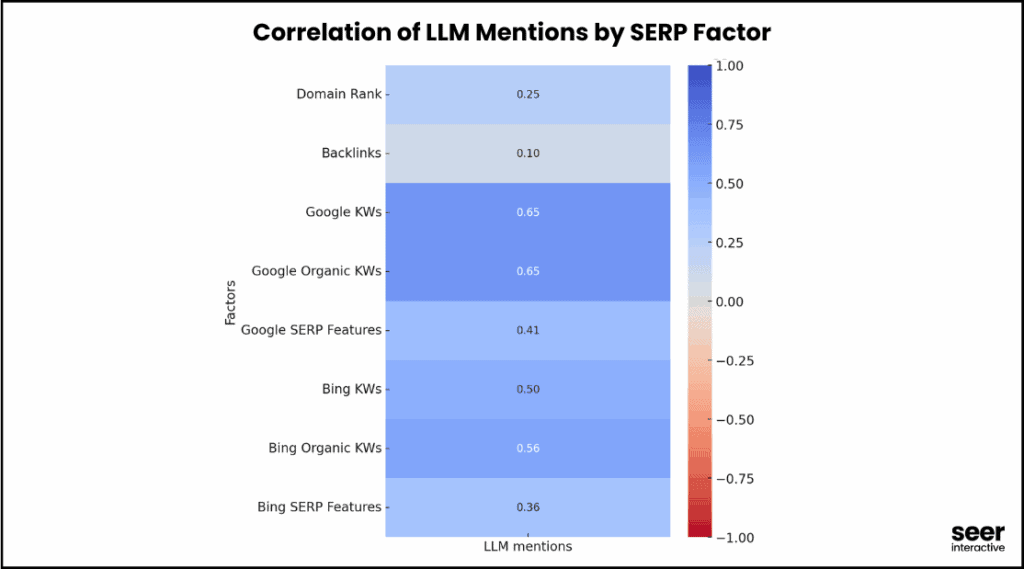
Organic rankings often drive:
- Inclusion in search-augmented models like Bing Copilot and Perplexity
- Greater backlink opportunities from AI-curated sources
- Higher entity recognition from crawlers like Google’s NLP
Speaking of Bing, it’s important to note that ChatGPT uses Bing as the basis of its search functionality, meaning ranking well in Bing SERPs means you’ll often get mentioned in ChatGPT responses.
So yes, keep doing on-page SEO, building ethical backlinks, improving site structure, and publishing high-value content. It all feeds the same ecosystem.
Audit and Test Your Brand Visibility in LLMs
You don’t have to guess how your brand appears in AI conversations. You can test it today. Here are a few prompts to try:
- “What is {{your company}}?”
- “Best {{product category}} tools for {{use case}}”
- “Alternatives to {{competitor name}}”
- “What software do {{your audience}} use for {{goal}}?”
Do this across multiple models: Perplexity, Gemini, Claude, and ChatGPT (with web browsing enabled). Compare answers. Note where you’re mentioned, how you’re described, and whether links or summaries are included.
This proactive approach helps you find opportunities to improve and track how changes to your content or backlink profile influence LLM visibility over time.
Think Beyond Rankings, Aim for Recognition
In traditional SEO, visibility often meant clicks. With LLMs, it means presence in trusted, high-intent conversations. Even without traffic, being named in an answer can influence perception, brand awareness, and eventually, buying decisions.
The average AI search visitor (tracked to a non-Google search source like ChatGPT) is 4.4 times as valuable as the average visit from traditional organic search, based on conversion rate( according to a study by Semrush).
LLM SEO is the art of becoming the answer. It’s no longer just about keyword research or targeting. Success hinges on narrative clarity, brand consistency, and owning a distinct space in your category.
How Spacebar Collective Supports Your LLM SEO Efforts
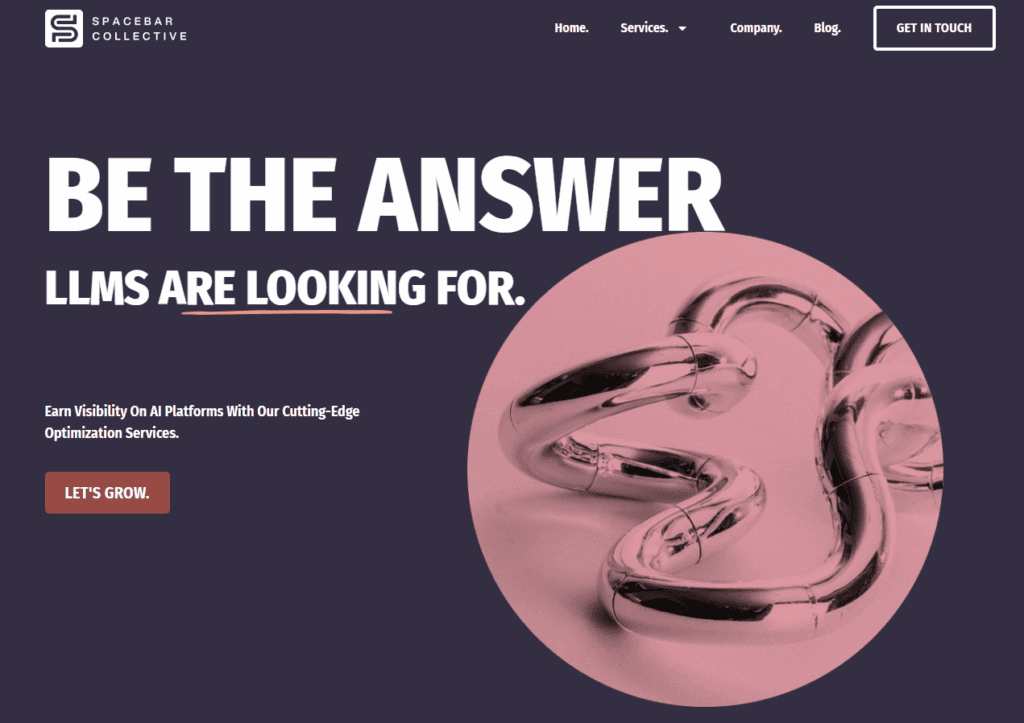
LLM SEO rewards the same disciplined, long-term approach that has always separated sustainable SEO from quick fixes. At Spacebar Collective, that’s been our focus from day one.
We primarily help B2B SaaS and AI-focused businesses grow sustainably by producing structured, useful content at scale and earning relevant backlinks from authoritative sources.
These same foundations now play a key role in how LLMs surface and cite brand content.
Our team is already helping clients adapt:
- Mapping which pages are likely to show up in LLM answers
- Restructuring on-site content for machine readability
- Guiding ethical authority-building that improves your chances of being referenced in trusted AI responses.
As LLM SEO evolves, we’re already integrating AI visibility audits into our comprehensive SEO assessments. We track how your brand appears in AI responses, identify content gaps that affect mentions, and help you build a structured, citation-worthy brand presence that positions you for both classic SEO and AI search success.
Key Takeaways
Optimizing for LLMs means shifting your focus from just ranking and winning clicks to becoming a trusted, citable entity in the vast knowledge base AI systems draw upon.
This requires a multi-pronged approach that complements, rather than replaces, your existing SEO efforts. In many cases, brands that surface in AI results today didn’t (or are yet to) optimize for AI. They simply had the right signals in place.
At Spacebar Collective, we help you become one of those brands on purpose. From ethical link-building to high-quality content engineered for LLM retrieval, we’re already preparing clients for what’s next. Contact us today.


